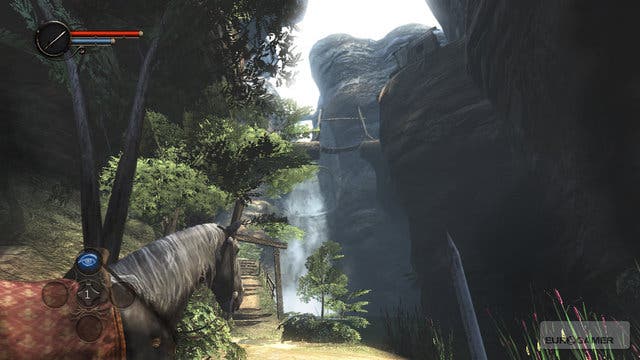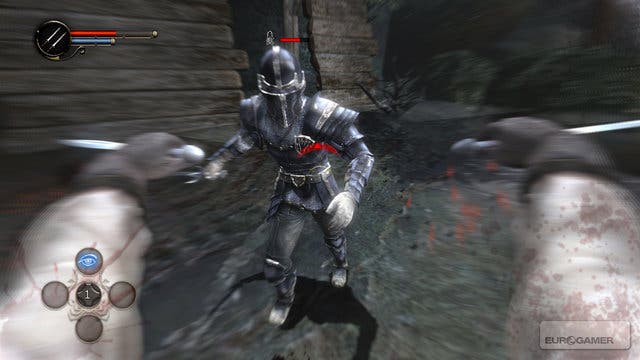Dark Messiah of Might and Magic: Elements
Orcward.
Ridiculously, the game has no auto-save, meaning that if (like me) you switched the machine off at the end of a session, you'll have to start over. Worse still, if (like me) you end up playing the game all evening and fail to save, then (like me) get stuck inexplicably in a piece of scenery or find that the game has just locked up for no apparent reason, you find yourself having to go back to the last save - even if that was four hours ago. Yes, despite regularly checkpointing your progress, it doesn't write those checkpoints to disk. And if that doesn't sound annoying enough, how about the time when a scripted sequence failed to cue up and I was left wandering around for ages wondering what to do next? It was only when I deliberately died and went back to the last checkpoint that it became apparent I was doing nothing wrong, and merely the victim of shoddiness. Trust evaporates after something like that.
Even less forgivable are the optimisation issues. Surely a 16-month-old PC game based on Source (an engine from 2004, remember) should be capable of running on the 360 without a hitch? A few bits of slowdown and some tearing we can tolerate, but Dark Messiah: Elements regularly grinds to a near-halt when there are more than a handful of enemies on the screen - even when they're not in view. Not useful when you've got a gaggle of zombies lurching towards you and you're trying to aim your lightning bolt or fireball. Ubisoft is no stranger to dodgy ports (Double Agent PS3, anyone?), but this is a particularly special shambles. No wonder it continually slipped - it makes you wonder what the game was like when it was originally due out. Perhaps it murdered kittens if you inverted the Y-axis.

Then again, Elements is hardly glorious-looking. The character models are alright, with gory damage effects when you're busy stabbing them in the face, but the environments are patchy. Texture levels aren't up to modern standards, and the game is plagued with lighting issues that only get worse if you fiddle with the in-game brightness and contrast. In what's already a very dark game, the underground levels are gloomy beyond understanding. You're supposed to use your night-vision in such situations but, er, it doesn't make it easier to see. Elsewhere, a broken implementation of the HDR-style lighting effects often fails to turn on or off properly, meaning outdoor areas are drenched in saturated contrast longer than they should be, before jarringly popping back to normal levels. There are times when the game's intricate architecture is grand and imposing; and when it's all running smoothly, it conveys a chilling atmosphere that draws you in. It's just not very consistent.
If you find yourself able to tolerate everything I've mentioned, then there are some great set-piece moments hidden away among the dungeon-crawling slog. Even when it descends into "let's throw every single enemy and every boss you've faced so far at the player in waves" territory towards the climax, the combat is so enjoyable that you don't mind. You're such a roaring badass by that stage that you're pulling off adrenaline kills for fun and experimenting far more because you know you're so powerful it'll probably work.

With a paucity of players currently playing the game online, it's not really fair to judge quite how much of a difference the online modes make, but it's fair to say that if it wasn't a big draw on the PC it won't be now. For its 360 release you can expect to play against up to ten players, with the usual Xbox Live player or ranked matches possible. As well as the usual Deathmatch and Team Deathmatch, you get three other team-based modes. Training acts as a basic introductory mode where you only have one skill per class to master, and the idea is to capture the other team's control point. Blitz has no respawns, and, again, involves capturing a control point, while the objective-based Crusade mode lets you play as the humans or undead trying to destroy the opposing stronghold. Set across five maps, you start in the middle map, with the balance of power shifting depending on who wins each round.
Anyway, I love and hate Dark Messiah: Elements. For everything that's good about the combat intensity, the flexibility of the skill system, the quality of the puzzles and the brooding, engaging atmosphere, it's undone by massive technical problems. After such a long wait, the last thing we expected was for it to be even more of a buggy, unoptimised mess than it was the first time around. But it is.

